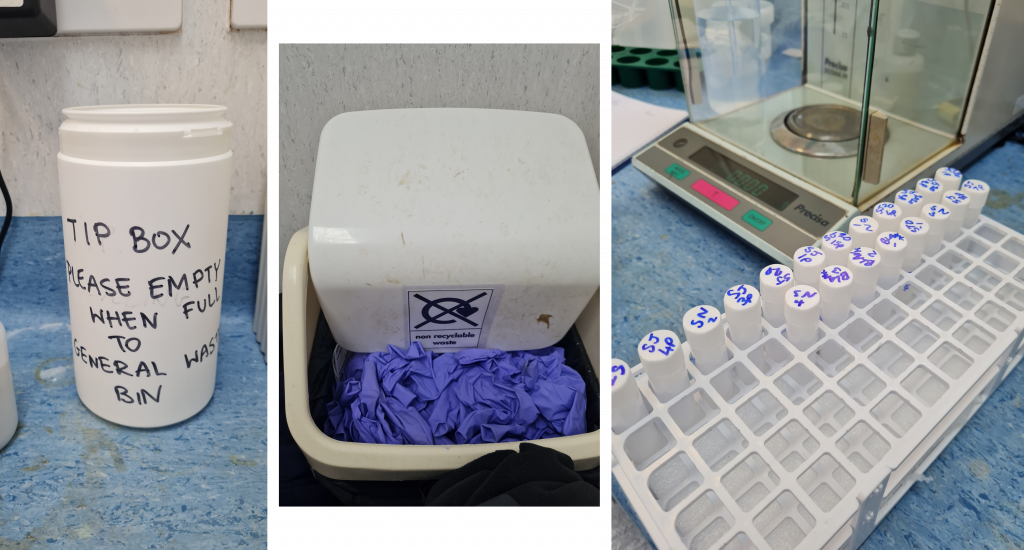Realising the contribution of science to plastic pollution
I have always been aware of the common sources of single-use plastics and how these are being reduced. One of the most influential discussions around plastic pollution in recent years was David Attenborough’s message in Blue Planet II in 2017. Since then, many beneficial changes to our day-to-day life have been implemented, including the ban on plastic straws in 20211 and the introduction of the carrier bag charge, also in 20212. Part of my keen interest in science is due to its ability to improve the sustainability of various sectors. However, a lot of the lecture content on this module has focused on the wastefulness of things I had previously not considered, such as prosthetic sockets, or wheelchairs not appropriate for their use. When I first entered a clean chemistry laboratory as part of my independent research project, I was shocked to see this wasteful side of science first-hand. The pictures below are ones I took. From left to right:
- A tub filling up with single-use pipette tips, which will not be recycled (“please empty when full to general waste bin”).
- A bin full of discarded nitrile gloves, some used for as little as 5 minutes with no contaminating substances on. This is 1 of about 5 of these bins in this laboratory alone. They fill up daily and are “non-recyclable waste”. This one particularly shocked me.
- A rack of single-use sample vials. These vials are being used for one stage of an experiment after which they’ll be thrown away.

This is just the tip of the iceberg: in 2014, it was estimated that research laboratories generated 5.5 million tonnes of plastic waste globally1.
Digging deeper
Seeing as I thought the plastic waste from one laboratory was excessive, I was interested in the scale of plastic waste from labs both in the UK and globally, and what was being done, if anything, to mitigate the issue. I attended a talk on plastic pollution by Professor Ian Williams, a Professor of Applied Environmental Science, where the issue of science’s contribution to plastic pollution was raised. Professor Williams acknowledged the huge issue of single-use plastic in science, particularly in hospitals where everything is single-use to maintain a sterile environment. However, he also said that there is “intent [to reduce the problem], but we are not quite there yet”. An example he raised was the LEAF project, which I hadn’t heard of and so decided to research further.

LEAF is a new approach to laboratory sustainability, developed by Sustainable UCL. It contains advice for laboratories on how to save plastics and other resources. Laboratories are awarded either a Bronze, Silver or Gold level, depending on their level of sustainability3. Some labs in Southampton have a Bronze Award, but in my opinion, we could do more.
Moving forwards
Luckily, some universities have implemented schemes to avoid wasting as much plastic. When researching more about single-use nitrile gloves, I found out that the University of Edinburgh has a glove recycling scheme in the School of Chemistry that recycled over a million plastic gloves in 20191. Additionally, in 2018 the University of Leeds pledged to remove single-use plastic from the entire university, including its research laboratories, by 20231.
In the future, interdisciplinary modules are ever-more important in bringing people from different sectors together to critically analyse the world we live in, and discuss how we can improve it. This module has made me think more broadly about the drawbacks of science as well as the benefits, and the steps that can be taken to mitigate these drawbacks.
References
- Alves, J. et al., (2020). A case report: insight into reducing plastic waste in a microbiology laboratory. In: Access Microbiology (3/3). London: Microbiology Society.
- UK Government, (2022). Carrier bag charges: retailers’ responsibilities. [online]. Available at https://www.gov.uk/guidance/carrier-bag-charges-retailers-responsibilities [accessed 21/03/23].
- Sustainability Exchange, (2023). LEAF – A New Approach to Achieving Laboratory Sustainability. [online]. Available at https://www.sustainabilityexchange.ac.uk/leaf_a_new_approach_to_achieving_laboratory_sus [accessed 23/03/23].